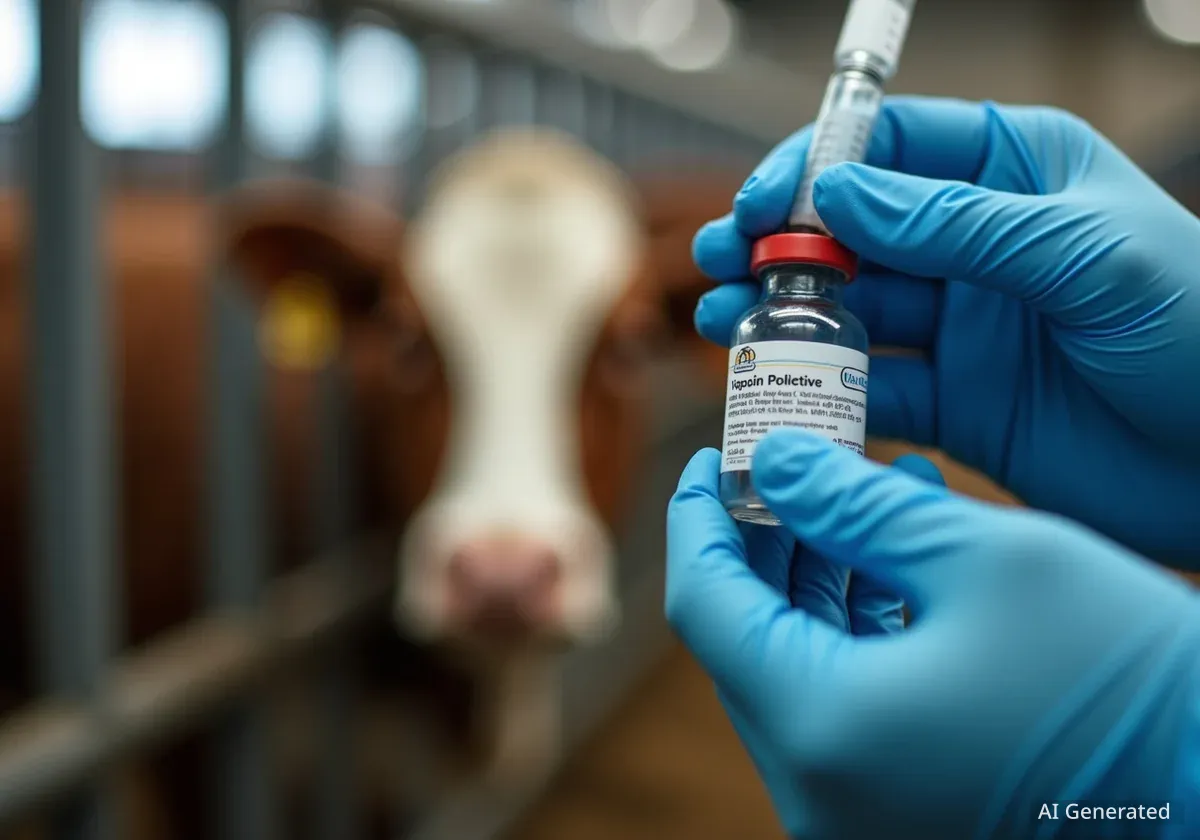Switzerland is strengthening its defenses against Lumpy Skin Disease (LSD), a viral cattle illness. While the country remains unaffected, neighboring nations have reported cases, prompting the Federal Food Safety and Veterinary Office (FSVO) to review and enhance protective measures.
Key Takeaways
- Switzerland is currently free of Lumpy Skin Disease (LSD).
- The FSVO has updated its contingency plans and preventative measures.
- Vaccination is a key strategy, with a significant stock of doses ready.
- Economic impacts are a major concern, even without direct outbreaks.
- Public awareness and strict animal movement controls are crucial.
Understanding Lumpy Skin Disease
Lumpy Skin Disease is a serious viral disease affecting cattle. It causes fever, skin nodules, and reduced milk production. The disease can lead to significant economic losses for farmers due to animal suffering, decreased productivity, and trade restrictions.
The virus primarily spreads through biting insects like mosquitoes and flies. Direct contact between animals can also transmit the disease, though this is less common. LSD does not pose a risk to human health, but its impact on livestock is severe.
Disease Fact
LSD is a notifiable disease, meaning any suspected case must be reported immediately to veterinary authorities. This allows for rapid response and containment efforts.
Swiss Proactive Stance
Despite no reported cases within Switzerland, the FSVO is not taking any chances. The proximity of affected countries in Europe has elevated the risk assessment. The federal office is working closely with cantonal veterinary offices to ensure a coordinated response.
One of the primary strategies involves rigorous border controls. All cattle entering Switzerland undergo strict veterinary checks. This helps prevent the introduction of infected animals or contaminated products.
"Our priority is to protect Swiss livestock from this devastating disease. We are implementing a multi-faceted approach, combining prevention, preparedness, and rapid response capabilities," stated a representative from the FSVO.
Vaccination Strategy and Stockpiles
Vaccination is a critical component of Switzerland's defense plan. The FSVO has secured a substantial reserve of LSD vaccine doses. This stockpile ensures that if an outbreak occurs, the country can quickly initiate a vaccination campaign to protect susceptible animals.
The decision to vaccinate would depend on the specific epidemiological situation. A targeted vaccination approach might be used in affected areas or along border regions. A blanket vaccination across the entire country is not the immediate plan but remains an option.
Background on Vaccines
LSD vaccines are live attenuated vaccines, meaning they contain a weakened form of the virus. This stimulates an immune response in animals without causing the full-blown disease. The effectiveness of these vaccines is high, providing significant protection.
The FSVO has also developed detailed protocols for vaccine distribution and administration. Training programs are in place for veterinarians and agricultural staff to ensure efficient and safe vaccination procedures.
Economic Implications for Agriculture
The potential economic consequences of an LSD outbreak are considerable. Even without direct infection, the threat of the disease can lead to significant disruptions in the agricultural sector. Trade restrictions on live animals and animal products could severely impact exports.
Farmers might face increased costs for biosecurity measures, veterinary care, and potential culling of infected herds. A decline in milk production and weight loss in beef cattle would also reduce profitability. The dairy industry, a cornerstone of Swiss agriculture, would be particularly vulnerable.
- Direct Costs: Veterinary treatments, culling, disposal of carcasses.
- Indirect Costs: Reduced milk yield, weight loss, impaired fertility.
- Trade Barriers: Restrictions on export of live animals and dairy products.
- Farm Income Loss: Decreased productivity and market access.
The FSVO is actively engaging with agricultural organizations to raise awareness about these risks. They are providing information on best practices for biosecurity on farms and advising on early detection methods.
Surveillance and Reporting Systems
Effective surveillance is paramount to early detection. Switzerland maintains a robust animal health surveillance system. This includes regular monitoring of cattle herds and prompt investigation of any suspicious symptoms.
Farmers and veterinarians play a crucial role in this system. They are encouraged to report any signs of unusual skin lesions, fever, or other symptoms consistent with LSD immediately. Early reporting can significantly limit the spread of the disease.
The FSVO has also established communication channels for rapid information exchange with international veterinary organizations. This ensures that Switzerland stays informed about the global epidemiological situation and can adjust its measures accordingly.
Public and Farmer Engagement
Public awareness campaigns are being rolled out to inform farmers about the disease. These campaigns emphasize the importance of hygiene, insect control, and strict biosecurity protocols. Educational materials are distributed to help identify symptoms and understand reporting procedures.
The FSVO stresses that a collective effort is needed to keep Switzerland free from LSD. Every farmer has a responsibility to protect their animals and contribute to national animal health security.
Did You Know?
LSD was historically confined to Africa, but in recent years, it has spread to parts of the Middle East, Asia, and Eastern Europe, highlighting the need for global vigilance.
The continuous monitoring of animal movements, both national and international, remains a top priority. This includes tracking cattle imports and ensuring compliance with all veterinary health certificates. The goal is to maintain Switzerland's status as a country free from Lumpy Skin Disease.




